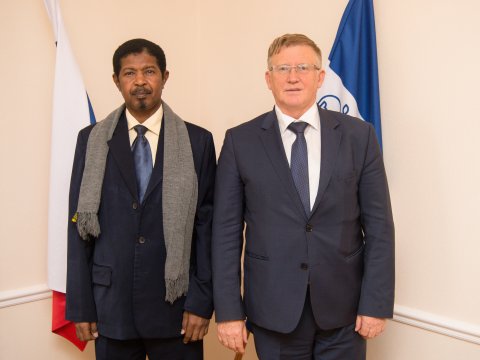South Ural State University is continuing to expand the borders of its international collaboration. SUSU Rector Aleksandr Shestakov has signed a partnership agreement with Sudan University of Science and Technology, which was represented by Rector Rashid Ahmed Mohamed Hussein. Professor Hussein is also the director of the Department of Research at the Ministry of Higher Education and Science of the Republic of Sudan.
Sudan University of Science and Technology, located in Khartoum, is one of the major universities in Sudan. It was founded as a result of the unification of technical colleges and schools, and today there are 75,000 students and around 3,000 members of teaching staff. As member of the delegation, Professor Hussein spent two event-packed days in the capital of the South Ural region. As a result, an agreement on future partnership with SUSU was signed.
“The strategic development of our university includes establishing contacts with foreign nations. We have signed a collaboration agreement with the major university of Sudan. First and foremost, this agreement implies creation of work experience programmes at SUSU for staff and teachers from our partner university. This is because they saw that there is a serious technical infrastructure available here for them to complete their research studies. We will also create joint Master’s degree programmes for students, and advanced training courses for teachers. We discussed the possibility of supplying teaching equipment to Sudan. Our university is a leader in Russia in creation and manufacture of teaching equipment, and this is also topical for them,” says SUSU Rector Aleksandr Shestakov.
.jpg)
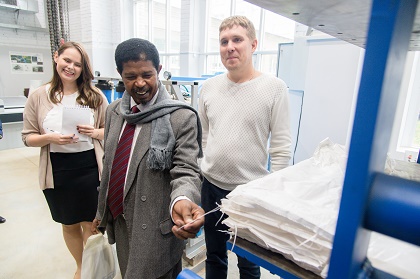
The Rector of Sudan University of Science and Technology was impressed by the SUSU’s innovative technical infrastructure. He began his tour of the university with the Mechanical Engineering Research Institute, which is the main space for practical training for students in technical fields and fulfils real orders for businesses in the South Ural region. Guests to the university also saw a demonstration of the potential of the Nanotechnology REC. This research and education centre works on a wide range of issues in the research of nanomaterials, widely-used metals, alloys, ceramics, glass, polymers, composites, and other materials.
Special attention was paid to the SUSU Supercomputer Centre, with which it is possible to solve the most topical issues in various fields. The supercomputer resource is used by engineering companies and research centres working on modelling physical processes, chemical phenomena, and nanoparticles, by industrial businesses, and in creation of animated films and special effects for the film industry.
“South Ural State University is one of the most respected Russian universities. We are especially interested in the opportunity to create exchange programmes for our teaching staff, researchers, and students, for them to study at South Ural State University and learn necessary skills. In particular, this form of collaboration will help with learning foreign languages and applied skills for representatives of both universities. We visited the university’s laboratories and saw that the engineering field is truly strong there, and this is very important to us. I was impressed that the university is working on supercomputer modelling and nanotechnologies,” says Rector of Sudan University of Science and Technology Rashid Hussein.
Aleksandr Diakonov, Vice-Rector for Research, speaks about the importance of working with foreign universities in research and creation of international collaborations:
“Introducing our foreign partners to the university’s infrastructure helps attract postdocs, because our laboratories allow them to complete serious research. International contacts in research are created through this, which then grow in to international collaborations. This strengthens our position as a research university and supports the recognition of SUSU in the international research space and strengthens our position in QS ranking and other authoritative rankings.”
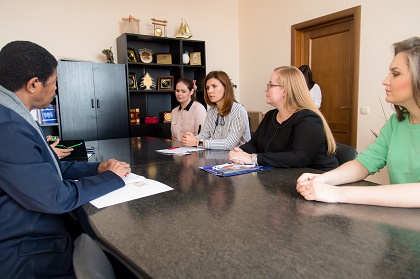
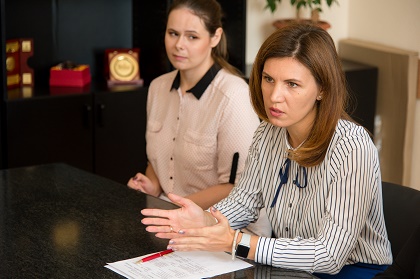
Signing of agreements makes a serious contribution to the development of international contacts. This event is particularly important for partnership between the North African nation and the Chelyabinsk Region. Representatives of the delegation spoke about the possibility of signing an agreement between Sudan and the South Ural Region with the head of the Department for Higher Education and Science at the regional Ministry of Education and Science Elena Kochanova.
“International partnerships are one of the most prioritised fields of development for the Chelyabinsk Region. They involve both academic exchanges and joint research projects, which we are interested in as part of the execution of the national project “Science”. The project was created by the Ministry of Higher Education and Science of the Russian Federation to strengthen the workforce, upgrade the infrastructure of higher education organisations, and create world-class research centres. These goals will support the competitiveness of Russian universities. South Ural State University actively participates in this project. I think that partnership between SUSU and international colleagues will support the establishment of partnership with Sudan and the creation of international research laboratories at the major university in our region,” stresses Elena Kochanova.
South Ural State University has always been attractive to representatives of Arab countries, notes Lyudmila Lapina, Head of the SUSU International Office:
“South Ural State University is very attractive to representatives of Arab countries; students are happy to come to study here. The academic programmes offered at our university meet their needs. They earn quality education here and then return to their home country to support higher quality of life for their compatriots. Several students from Sudan already study at SUSU, but we are working on attracting more students from there. We are working with the Embassy of Sudan in the Russian Federation on this.”
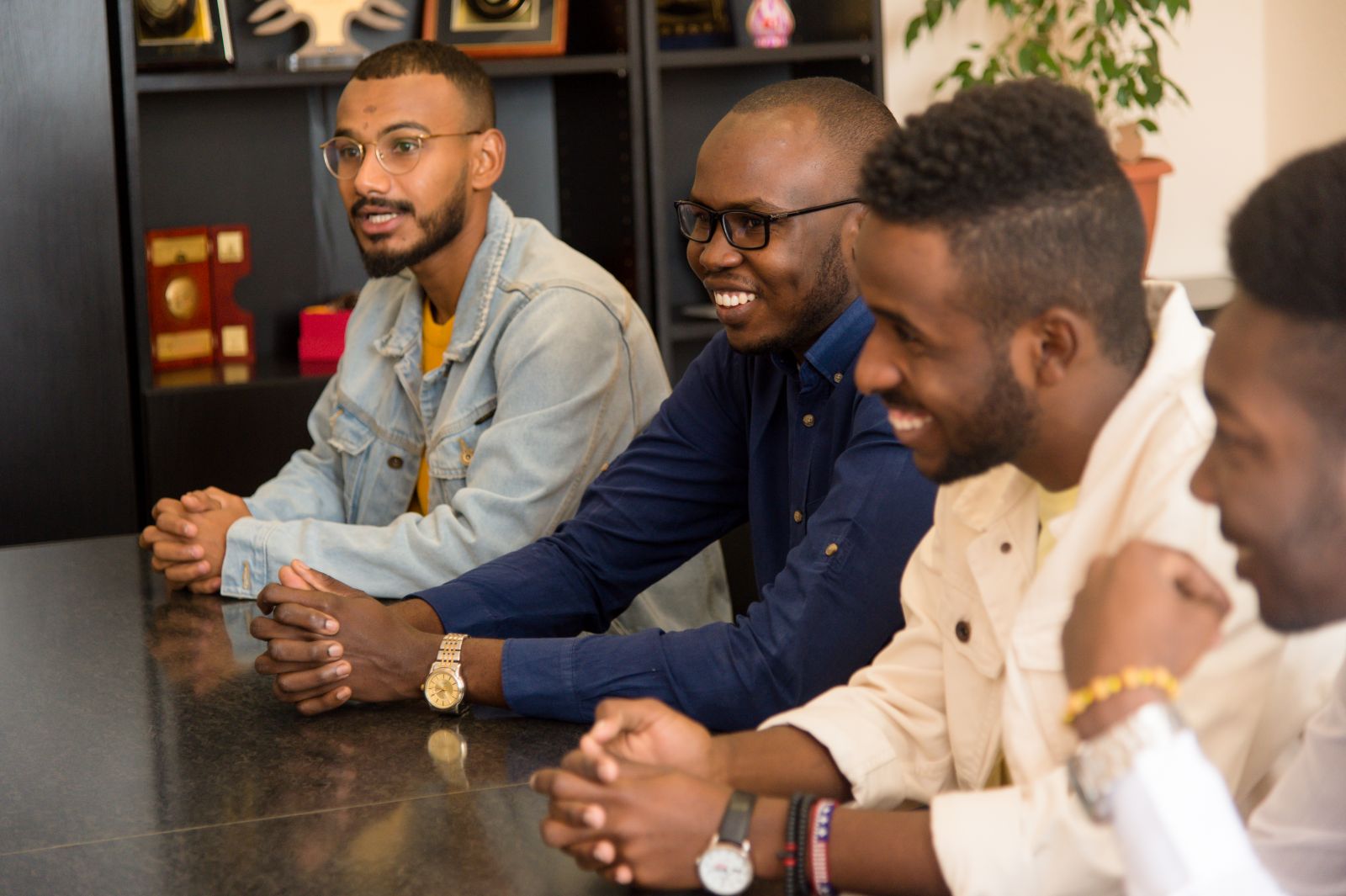
On the second day of the delegation’s visit, the Rector from Sudan met his fellow countrymen, SUSU students from Sudan. He asked them about their impressions of South Ural State University, their fields of study, and their plans for the future.
“I enrolled at SUSU after completing my Bachelor’s degree in Sudan. I am now in the second year of my Master’s degree at the School of Economics and Management. It is interesting to be here, everyone is very friendly to me and my compatriots. After graduating, I want to continue into postgraduate studies if I have the chance. And I will gladly support any of my compatriots who come to SUSU from Sudan University of Research and Technology. I can say right away that they will like it here!” says Sudanese student Hag Elnur Khamid.
Expanding the borders of international collaboration is one of key fields at South Ural State University, and the university has achieved significant success over the years of working on it – more than 2,000 students from 52 countries study at SUSU.




